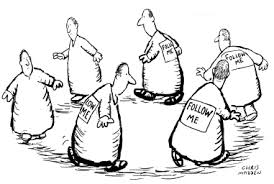I’ve been described by many as a non-conformist.
Also disagreeable, unconventional, critical, and obstructionist.
I can’t disagree, even though I’m inclined to disagree.
In fact, when coaching business leaders, I often advise them to seek new ground. I encourage them to find a new, and whenever possible, opposing viewpoint. I urge them to tell stories, be vulnerable, and be amusing because so few people in business do any of these things.
It’s in this uncharted ground that value can often be found. Fertile ground is where new ideas can be cultivated. Standing apart from others makes you entertaining, engaging, and unforgettable.
Research has also found that as soon as someone disagrees or even can’t decide, social conformity is reduced.
In social psychology, conformity bias is defined as the act of changing one’s behaviors, beliefs, or attitudes to fit in with other people. It begins around age 12 and becomes more pervasive in groups of three to five people.
Conformity is attractive to many people because it is often easier to follow the examples of others rather than to venture out alone. The pressure to conform affects everyone, reducing individuality, originality, innovation, and productive risk-taking.
Conformity feels safe and appeals to many, but it’s often detrimental to the individual and society. Conformity often leads to unhappiness, as people feel they can’t express their feelings and opinions and be themselves. To conform, they lose their individuality and self-expression, and the possibility of innovation, reform, and invention disappear.
In the workplace, conformity flattens behavior, reducing the number of new ideas generated. It also results in less productive risk-taking and fewer instances of potentially beneficial opposition.
In short, conformity results in a bunch of people behaving similarly, expressing similar ideas, and nodding in agreement far too often.
However, studies have found that conformity can be reduced from a high of 97 percent on a visual judgment task to only 36 percent when a competent dissenter is present.
In other words, the nonconformist can reduce conformity in a group simply by expressing a nonconforming viewpoint.
Nonconformists breed nonconformity.
They afford people permission to be themselves.
Someone recently approached me and said, “Today’s meeting won’t be something you like. I can already see you opposing this idea. Could you please support me and keep your views to yourself this time? It’s important to me.”
I laughed. My former principal used to do the very same thing. When he knew that an idea, initiative, or plan would not sit well with me, he’d occasionally ask me to keep my opinions to myself and discuss my opposition in private.
It would seem that both of these people understood the nature of this research:
If I expressed my nonconformist views, the chances of achieving a majority agreement would likely be diminished. By disagreeing, I permitted others to disagree, too.
Of course, nonconformists can also cause trouble. While they may reduce social conformity, thus making it easier for people to be themselves, they can also be troublemakers by convincing others to reject norms.
My mother called me “The Instigator” for good reason.
As a boy, I would relentlessly seek alternative viewpoints and ways of doing things to gain and leverage my autonomy, stand out in a crowd, and become known to the world. This led me to do things like:
- Teaching myself to read upside down to annoy teachers.
- Finding ways to cook pizza on camping trips while others were cooking hamburgers and hotdogs.
- Writing scathing editorials in the school newspaper about school administrators.
- Standing on the front steps of my high school as a freshman, passing out “Seniors are wimps” flyers.
- Being suspended for “inciting riot upon myself.”
- Becoming a Yankees fan while living outside of Boston.
- Refusing to complete homework assignments that “diminished me.”
- Converting myself from a sprinter to a pole vaulter.
- Parking my car in the faculty parking lot because “I work just as hard as those teachers.”
- Playing the bassoon because it was new to our school, and no one else was playing it.
- Trying out for the cheerleading squad.
- Taking French 4 when French 4 did not exist.
Sometimes, nonconformists do things differently and disagree because they believe in what they say and do.
Sometimes, they seek new ground to annoy others and garner attention.
I like to think that today, I almost always express what I believe and think is right, but as a boy, it was an admittedly mixed bag.



